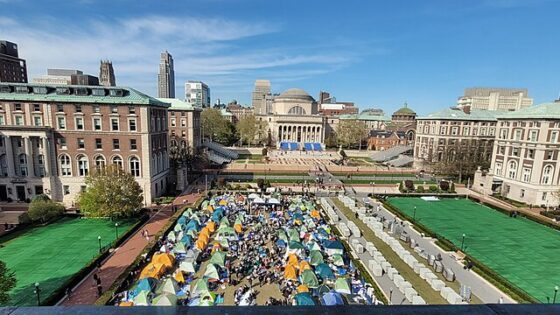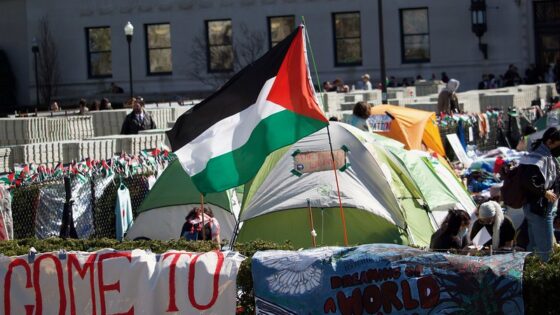The 2007-08 academic year has been lively and challenging for the Columbia University SPME chapter.
In early August 2007, Columbia University president Lee Bollinger issued a strong statement consistent with the SPME stand opposing the British University and College Union (UCU) vote to advance a boycott of Israeli academic institutions. On August 8, the statement was published as the centerpiece of a full-page advertisement in The New York Times that included endorsements by hundreds of other college and university presidents and chancellors. The headline said “Boycott Israeli Universities? Boycott ours too.” Some students sent thank you notes to President Bollinger. Rather than deluge his email box, chapter faculty sent thank you notes to the chapter listserv; we then batched each day’s notes and sent them to him. He thanked us for the support, but other faculty members who favored the boycott were offended by his statement.
Shortly before Rosh Hashanah, we learned that he had invited Iranian president Mahmoud Ahmadinejad to speak at Columbia on Monday September 24. Chapter faculty and others sent letters and emails to Bollinger in an effort to convey that contrary to his stated belief, academic freedom did not require Columbia to give a podium to this liar, murderer, and funder of terrorists. Bollinger’s arrangement with Ahmadinejad was that he would introduce him and ask him hard questions. He did so, in a highly publicized gathering that was televised to the Campus Walk and other venues. Reviews were mixed.
During the summer of 2007, we learned that Nadia Abu El-Haj, an assistant professor of anthropology at Barnard College, was being reviewed for tenure. Barnard alumnae were circulating a petition opposing tenure for Professor Abu El-Haj, whose sole claim to scholarship is a book based on her dissertation, titled Facts on the Ground. In the book, Abu El-Haj claims that Israeli archaeology is totally politicized and used to make claims about a Jewish presence in the land of Israel in ancient times that are not supported by evidence; she also claims that Israeli archaeologists have intentionally destroyed or cast aside evidence of the presence of other groups in antiquity. The official position of SPME is that we do not intervene in the tenure process. We therefore did not circulate or promote the Barnard alumnae’s petition. However, in the course of dealing with the issue, we became aware of widespread interest in Biblical archaeology and of the availability of distinguished archaeologists to speak at Columbia on the subject. We therefore sponsored, jointly with LionPAC (student pro-Israel organization), an Underground Lecture Series (subtitled, What Archaeology Tells Us about Ancient Israel) of 4 programs:
- Alan Segal, PhD, Professor of Religion and Ingeborg Rennert Professor of Jewish Studies, Barnard College: What Biblical Archaeology Tells Us About
the First Temple Period, 9/17/07 - William G. Dever, PhD, Professor Emeritus of Near Eastern Archaeology and Anthropology, University of Arizona: Did God Have a Wife: Archaeology and Folk Religion in Ancient Israel, 10/15/07
- Aren M. Maeir, PhD, Professor and Chair of the Martin Szusz Department of Land of Israel Studies and Archaeology, Bar-Ilan University: The Archaeology of the Philistines: Findings Relevant to
- Ancient Israel and the Development of Biblical Text, 11/19/07
- Jodi Magness, PhD, Kenan Distinguished Professor for Teaching Excellence in Early Judaism, University of North Carolina, Chapel Hill: Jerusalem in the Time of Herod, 2/4/08
The first lecture was attended by about 70 people, including students, faculty, members of the community, and some members of the press. Subsequent lectures were attended by 50-75 people.
In addition, Herbert London, John M. Olin Professor of Humanities Emeritus, New York University and President of the Hudson Institute, spoke on The Origins, Evolution, and Future of Academic Freedom, on 11/5/07. That lecture was attended by only about 15 people. And Matthias Kuentzel, PhD, an SPME Board member and author of the recently published book Jihad and Jew-Hatred: Islamism, Nazism and the Roots of 9/11, spoke on Anti-Semitism, Holocaust Denial and the Cult of Sacrifice: The Iranian Holy War, on 3/6/08, to a live audience of about 50 people and a webcast audience of >100 more.
The chapter also arranged for Sapir College professors Uri Bibi and Ruthie Eitan to speak on 2/12/08 and Barzilai Hospital Public Affairs director Lea Mallul to speak on 3/20/08 at the Columbia University Medical Center, sponsored by the Department of Psychiatry, to audiences of about 20 each.
In late October, we learned that a group of faculty members were circulating for signature a statement critical of President Bollinger and would formally present it at an Arts & Sciences faculty meeting on November 13. The group had named itself the Columbia University Faculty Action Committee (CU-FACT). The chapter therefore circulated a statement defending Bollinger. The CU-FACT group used departmental listservs for its petition. The SPME chapter used only the Columbia SPME chapter listserv. In the end, the CU-FACT statement had about 150 signatures and the Columbia SPME dissent about 80. Both statements were published in the newspapers.
The CU-FACT statement criticized Bollinger for:
- Failing to “make it unequivocally clear that… interventions [such as petitions against tenure decisions] would not be tolerated”
- Making decisions about “key issues like the ‘globalization’ of the university… the hosting of controversial speakers, the relative diminution of the humanities” without consulting faculty
- Making remarks to Ahmadinejad that “allied the University with the Bush administration’s war in Iraq”
- Taking “partisan political positions concerning the politics of the Middle East in particular, without apparent expertise in this area”
The SPME dissent argued that:
- People who are concerned about what happens on university campuses are justified in expressing, and entitled by the First Amendment to express, their objections. No university administration has the power to prevent such expression
- The university is not obliged to consult faculty regarding budgetary and enrollment decisions
- According to the publicly available transcript of the Ahmadinejad event, Bollinger had referred to the war in Iraq only to denounce Iran’s role in financing and arming terrorist attacks on US troops
- The only “partisan political position” that Bollinger had taken on the Middle East was his opposition to the UCU boycott, an opposition based on his recognition that the proposed boycott was a violation of academic freedom that threatened the entire academic enterprise
On April 14, the New Yorker magazine published an article by Jane Kramer, describing the events surrounding the award of tenure that Professor Abu El-Haj had received on November 1. The article was blatantly biased against Abu El-Haj’s critics, specifically mentioned SPME, and misrepresented the criticisms of Abu El-Haj’s scholarship as purely politically motivated. An article by Eric Alterman in the Nation repeated the same themes without fact checking. Letters from me and others criticizing both articles were subsequently published.
We face challenges in attracting audiences of any size, given our lack of talent and time for publicity, but we clearly have faculty support, at least in the professional schools, and among the isolated and embattled professors in the humanities and social sciences who are not inclined to demonize Israel. We also face challenges in fundraising, as does SPME as a whole.
In response to questions that have arisen recently regarding the status of chapters as formally registered campus organizations, here is some history. Our chapter was SPME’s first. At the time it was founded, in early 2004, we were not aware of any other campus-based faculty organizations, other than a few professional organizations and journals that have headquarters wherever the current president or editor-in-chief is based, and it simply never occurred to me to try to register the chapter with the Columbia administration. In those days, Rabbi Charles Sheer was the head of Columbia Hillel; he was supportive, but he never suggested that we try to register the chapter in the way that student organizations are registered, perhaps simply because the concept was too new. In any case, 4 years later, we still have no official status at Columbia, but we function fairly well without it. We have a listserv of ~400 faculty and a few other members of the community. We have meetings with a speaker every 1-2 months. Faculty members can generally book a room for a meeting as needed, without having to provide too many details. On the few occasions when we have had to pay for the use of a room, we have simply passed the hat. We announce events on the listserv and sometimes ask one of the student organizations to announce them. By now, the Columbia administration is well aware of Columbia SPME’s existence, but to the best of my knowledge no one has complained about the chapter’s unofficial status. If we had thought that by registering we might acquire access to university funds for programming, we might have tried, but the idea never occurred to us before now, and given the nature of our work, it seems implausible.




